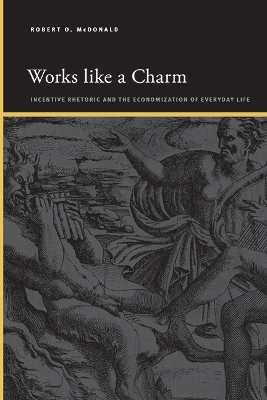
Works like a Charm
Incentive Rhetoric and the Economization of Everyday Life
Seiten
2024
State University of New York Press (Verlag)
978-1-4384-9408-1 (ISBN)
State University of New York Press (Verlag)
978-1-4384-9408-1 (ISBN)
Breaks the spell of economic thought by interrogating the widespread language and logic of “incentives” in public life from a Lacanian perspective.
Works like a Charm addresses a simple question: Why are “incentives” everywhere now? From inducements to work harder at our jobs to tax rebates for corporations, “incentive” names a general theory of motivation—according to economists, we are incentive-driven creatures. Yet far from being a neutral generalization, this understanding of human behavior smuggles in a quintessentially economic way of seeing the world. Works like a Charm applies Jacques Lacan's psychoanalytic concept of retroactive causality to explain the metastasis of the language and logic of incentives: To discover an incentive is to place in the untouchable past an economic cause for a contextual, historical force. Tracing “incentive” from its roots in antiquity to its uptake by neoclassical and then Chicago-school economists, Robert O. McDonald diagnoses the spread of incentives across the social, cultural, and political field and warns readers of the dangers of handing over causality to the economists.
Works like a Charm addresses a simple question: Why are “incentives” everywhere now? From inducements to work harder at our jobs to tax rebates for corporations, “incentive” names a general theory of motivation—according to economists, we are incentive-driven creatures. Yet far from being a neutral generalization, this understanding of human behavior smuggles in a quintessentially economic way of seeing the world. Works like a Charm applies Jacques Lacan's psychoanalytic concept of retroactive causality to explain the metastasis of the language and logic of incentives: To discover an incentive is to place in the untouchable past an economic cause for a contextual, historical force. Tracing “incentive” from its roots in antiquity to its uptake by neoclassical and then Chicago-school economists, Robert O. McDonald diagnoses the spread of incentives across the social, cultural, and political field and warns readers of the dangers of handing over causality to the economists.
Robert O. McDonald is Assistant Professor of Rhetoric in the Department of Communication Studies at the University of Kansas.
Acknowledgments
Introduction: The Metastatic Logic of the Incentive
1. Incentives, Retroactive Causality, and the Rhetorical Unconscious
2. This Is Not a Pipe, or Incentives from Antiquity to Modernity
3. Gary Becker, the Godfather of Incentives
4. “What Does Woman Want?” Equal Pay and “Women’s Incentives”
5. Nudge Theory and the Politics of Neurosis
6. Nudging Ourselves to Death
Conclusion: Breaking the Spell
Notes
Works Cited
Index
| Erscheinungsdatum | 06.02.2024 |
|---|---|
| Reihe/Serie | SUNY series, Insinuations: Philosophy, Psychoanalysis, Literature |
| Zusatzinfo | Total Illustrations: 0 |
| Verlagsort | Albany, NY |
| Sprache | englisch |
| Maße | 152 x 229 mm |
| Gewicht | 227 g |
| Themenwelt | Geisteswissenschaften ► Psychologie ► Psychoanalyse / Tiefenpsychologie |
| Geisteswissenschaften ► Sprach- / Literaturwissenschaft ► Sprachwissenschaft | |
| Sozialwissenschaften ► Kommunikation / Medien ► Kommunikationswissenschaft | |
| ISBN-10 | 1-4384-9408-4 / 1438494084 |
| ISBN-13 | 978-1-4384-9408-1 / 9781438494081 |
| Zustand | Neuware |
| Informationen gemäß Produktsicherheitsverordnung (GPSR) | |
| Haben Sie eine Frage zum Produkt? |
Mehr entdecken
aus dem Bereich
aus dem Bereich
Buch | Softcover (2022)
Kohlhammer (Verlag)
CHF 47,60
Grundlagen, Behandlungstechnik und Anwendung
Buch | Softcover (2022)
Kohlhammer (Verlag)
CHF 48,95


